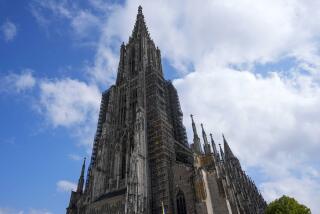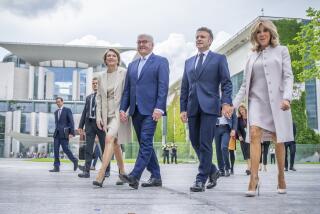Pope Visits Germany, Where Catholicism Has Seen Backslide
- Share via
BERLIN — Pope John Paul II on Friday began a 2 1/2-day visit to Germany, a country where membership in the Roman Catholic Church is in steep decline and opinion polls show that the Vatican’s strictures on contraception and priestly celibacy are at least partly to blame.
Theologians and lay Catholic activists plan to use the pope’s visit to Germany--the engine of the Protestant Reformation--as a chance to press for change.
“We want to make clear that we are not in the position of hating the pope, but we have serious questions, and those questions should be raised,” said Wolfgang Ullmann, a Lutheran theologian and member of the European Parliament who will be participating in dissident church functions today in Paderborn, where the pope will hold meetings and celebrate Mass outdoors.
“Maybe later on, he will give the answers,” Ullmann added.
Defections from the church’s lay ranks reached a record of 200,000 in Germany in 1992 and have stayed at about 150,000 a year since. There are 28 million Catholics in this country of 81 million and about 28.5 million Lutherans.
So strong is the sense here of an opportunity to be seized or missed that there are tantalizing rumors afoot that the pope had originally intended to put a breakthrough item on his itinerary: According to a report published in the newsmagazine Focus, John Paul II first considered traveling not to Paderborn but to the eastern city of Eisenach, where Martin Luther lived as an outlaw after his 1521 excommunication and reshaped Christendom by translating the New Testament into German.
In Eisenach, according to Focus, plans called for the pope to lift Luther’s excommunication--a gesture rich in symbolism this year, the 450th anniversary of Luther’s death. The report said conservative German bishops flew to Rome to talk the pope out of it and that they succeeded.
Germany’s Conference of Bishops called the report “nonsense,” but Focus is standing by its story, and the article has helped intensify widespread complaints here that the Vatican has lost touch with the needs of its faithful.
“The fact that after 450 years there is still no word about the banned Luther is really disgraceful,” said Friedrich Schorlemmer, a prominent social critic and the pastor of the church where, in 1517, Luther ignited the Protestant Reformation by nailing his 95 Theses to the door.
Catholics and Lutherans in Germany are carrying out extensive social works together, joining hands to help the unemployed, shelter failed asylum-seekers and fight conventional weapons proliferation, Schorlemmer noted.
“Luckily, people working toward ecumenism in Germany are much further along than Rome can even imagine,” he said.
John Paul II’s tour of Germany is his third visit here, but his first since the fall of the Berlin Wall in 1989. It was launched under the slogan “United in Hope,” thought to reflect the Polish pope’s contributions to the demise of communism in his home country and the rest of Eastern Europe.
The pontiff landed Friday evening in Paderborn, a strongly Catholic city in western Germany, where he will meet today with senior officials of the German Lutheran and Catholic churches and say Mass on a former British military airfield.
While it is clear that a grand gesture toward the memory of Luther himself is not in the offing, officials expect the pope to take a small step toward a bridging of the centuries-old rift between the Catholic and Protestant churches in the heart of Europe.
But in modern, heavily social-democratic Germany, many Catholics want more than an abstract rapprochement with the Lutherans.
They are focused on such practical matters as abortion, contraception, the ban on marriage for priests and the church’s treatment of women.
There are signs that the Roman Catholic Church in Germany is, if not dying, at least in serious trouble.
This year, in all of Berlin, a city of 3.5 million, not a single Catholic priest is expected to be ordained. And, with 150,000 Catholics renouncing church membership each year, many a village church has had to lock its doors--particularly in the former East--for lack of operating funds.
A good share of the blame for the exodus goes not to the Polish pope but to the German Finance Ministry, which deducts a 9% “church tax” from the paychecks of all registered believers here.
Catholic conservatives note that Lutheran memberships are plunging even faster than their own, and they say this shows people are upset about taxes, not about the Catholic bans on such Lutheran-sanctioned practices as contraception.
But opinion polls and the activities of Catholic dissidents suggest that Vatican conservatism is helping to drive Germans away.
Last November, a Hannover-based group called We Are the Church collected more than 1.5 million signatures on a petition for sweeping modernizations. Similar petition drives have been mounted in Austria and Belgium and are being organized in the Netherlands, France, Italy, Nicaragua, Spain, Mexico and the United States.
We Are the Church asked to meet with the pope during his visit to Germany, but the Vatican declined, saying organizers needed to bring their petitions to their bishops.
The German Council of Bishops has dismissed the petition drive, saying it “makes no useful contribution to the dialogue.”
About 25,000 other German Catholics have channeled their frustration into a 126-year-old splinter sect, the Old Catholic Church, which rejects papal infallibility and ordained two female priests this year.
Today in Paderborn, such reform-minded Catholics will engage in what they call “joyful criticism” of the Vatican on a sports field; married priests and homosexual Catholics are expected to take part.
On Sunday, when the pope goes to largely secular Berlin, the criticism of the Vatican is expected to be even louder. A gay and lesbian street party is being planned, as are three anti-papal demonstrations.
The pope is scheduled to say Mass before 130,000 people in Berlin’s historic Olympic Stadium, where in 1936 Adolf Hitler used the summer games to showcase Nazi power. In the afternoon in Berlin, the pope is scheduled to meet with German Jewish leaders.
Afterward, the pope will join German Chancellor Helmut Kohl, a practicing Roman Catholic, for a stroll through the Brandenburg Gate, a Berlin landmark that stands at the former “death strip” between East and West Berlin.
More to Read
Sign up for Essential California
The most important California stories and recommendations in your inbox every morning.
You may occasionally receive promotional content from the Los Angeles Times.













